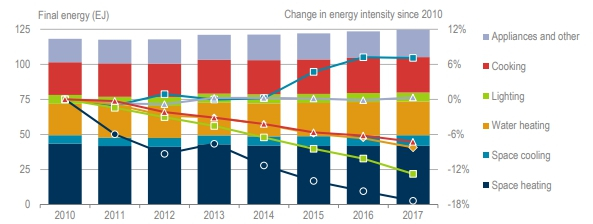
COP24
14:49, 08-Dec-2018
UN: More action needed to control emissions from buildings
Updated
14:07, 11-Dec-2018
CGTN

A large number of countries failed to implement policies to control heat-trapping emissions from buildings and construction sector. Nearly two‐thirds of countries still do not have building energy codes.
Buildings release nearly 40 percent of the global greenhouse gas emissions and account for 36 percent of all energy consumption, a report released on Friday at the ongoing global climate summit in Katowice, Poland, revealed.
The emission from the sector is likely to increase, as Africa and Asia are planning massive urbanization and construction of new buildings. With the rapid growth in the region, meeting the target of a 30 percent energy intensity improvement in buildings by 2030, agreed under Paris agreement, appears challenging.
The rising temperatures have already increased the use of energy-guzzling cooling systems globally. In the last seven years, the energy consumption by cooling systems soared by more than 25 percent. Today, more than 1.6 billion air conditioning units are in service.
"If we don't make buildings more efficient, their rising energy use will impact us all, whether it be through access to affordable energy services, poor air quality or higher energy bills," Dr. Fatih Birol, executive director of the International Energy Agency (IEA) said.

Global buildings final energy use and change in intensity by end use from 2010 to 2017 /UNEP Photo
Global buildings final energy use and change in intensity by end use from 2010 to 2017 /UNEP Photo
The report titled "Global Status Report: Towards a zero-emission, efficient and resilient buildings, and construction sector," prepared jointly by UN Environment Program (UNEP) and IEA, states that only 85 countries have adopted building certification programs.
Moreover, "Only 69 countries have enforced either voluntary or mandatory buildings energy codes, an increase from 54 countries in 2010," the report found.
Furthermore, investment in energy efficiency in buildings has slowed down. In 2017, the investment in green buildings increased by 4.7 percent, the lowest rate of increase in recent years.
The report also highlighted that heating, lighting and household cooking in buildings is witnessing significant course correction. Renewable energy uses by buildings increased by 14 percent and natural gas by five percent from 2010 to 2017.
Shift to clean energy sources has leveled off emissions from buildings and construction sector since 2015, the transition is likely to reduce energy use.
The findings are likely to heat-up the negotiation processes at Katowice where delegates from 190 nations are meeting to prepare a rulebook under the Paris agreement to contain global temperature rise.
"It's critical we have a big change over the next couple of years in how we do buildings and construction," said Joyce Msuya, deputy executive director of UNEP. "We need to raise the bar in energy-efficient, green buildings and far better practice in construction."
(Cover via VCG)

SITEMAP
Copyright © 2018 CGTN. Beijing ICP prepared NO.16065310-3
Copyright © 2018 CGTN. Beijing ICP prepared NO.16065310-3